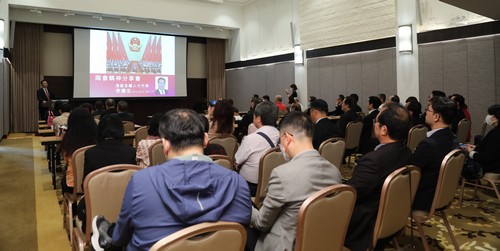 At the “2023 NPC & CPPCC Exchange and Sharing Meeting”, several of the Chamber's members who serve as NPC deputies and CPPCC National Committee members jointly discussed the key guiding principles and policy directions of this year's “Two Sessions”, as well as the implications for Hong Kong's future development.
At the “2023 NPC & CPPCC Exchange and Sharing Meeting”, several of the Chamber's members who serve as NPC deputies and CPPCC National Committee members jointly discussed the key guiding principles and policy directions of this year's “Two Sessions”, as well as the implications for Hong Kong's future development.
Starry Lee: Central Government attaches great importance to Hong Kong's development
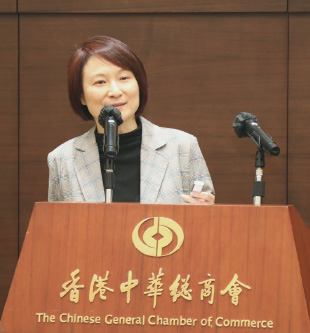 Starry Lee, the Chamber's Committee Member (NPC Standing Committee Member), said that this year's “Two Sessions” is both important and fruitful. “This is the first year of the country's journey towards its Second Centenary Goals, which is a milestone with great significance. For Hong Kong, it also marks a new beginning of its progress from stability towards prosperity.”
Starry Lee, the Chamber's Committee Member (NPC Standing Committee Member), said that this year's “Two Sessions” is both important and fruitful. “This is the first year of the country's journey towards its Second Centenary Goals, which is a milestone with great significance. For Hong Kong, it also marks a new beginning of its progress from stability towards prosperity.”
As for the fruitful results, Lee said that during the nine-day session, the NPC deliberated the work reports of the Central Government, the Supreme People's Court, the Supreme People's Procuratorate and the NPC Standing Committee, a draft amendment to the Legislation Law, and the State Council Institutional Reform Plan. It also elected several state leaders including the president of the PRC and the premier of the State Council of the PRC. All these showed the high efficiency of the NPC. The most notable was the unanimous election of President Xi Jinping. “The thunderous applause of everyone present fully demonstrated the common aspiration of the people of the whole country.”
In addition, in Lee's view, this year's “Two Sessions” also reflects the country's care for Hong Kong, because whether it is in the NPC or the CPPCC, Hong Kong has a higher share of representatives than that of any Mainland provinces and cities. “For example, Hong Kong, with a population of 7.5 million people, is represented by 36 deputies to the NPC and 196 members to the CPPCC, which are far higher than other Mainland provinces and cities in terms of ratio to the population.”
Jonathan Choi: Expectant anticipation for the country's high-quality development
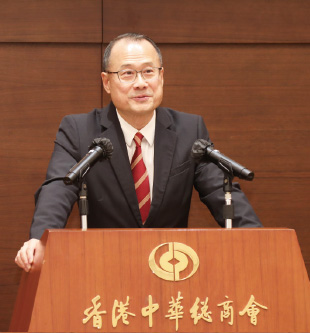 Jonathan Choi, the Chamber's Chairman (CPPCC National Committee Standing Committee Member), said that members of the CPPCC must stand united with the country, fully supporting the country in its development and implementation of the spirit of the 20th National Congress. He revealed that leaders of the CPPCC highly appreciated Hong Kong's CPPCC members for their very high attendance rate this year and their serious attitude. This year, nearly half of Hong Kong's CPPCC members are young and new, bringing a refreshing new look.
Jonathan Choi, the Chamber's Chairman (CPPCC National Committee Standing Committee Member), said that members of the CPPCC must stand united with the country, fully supporting the country in its development and implementation of the spirit of the 20th National Congress. He revealed that leaders of the CPPCC highly appreciated Hong Kong's CPPCC members for their very high attendance rate this year and their serious attitude. This year, nearly half of Hong Kong's CPPCC members are young and new, bringing a refreshing new look.
Choi said that, with the country promoting digital economy now, the CPPCC session also widely adopted new technologies. For example, after becoming the leader of a reading group at last year's “Two Sessions”, he has begun to use the electronic platform to perform his duties and submitted his proposals online. In his view, it is worth learning from the CPPCC session in keeping pace with the times.
Choi also said that the government work report stressed supporting the development of state-owned and private enterprises, especially stepping up support for the development and growth of private enterprises to promote the high-quality development of the private economy. This has given him a deep impression as a member of the business community.
The “Two Sessions” pushed forward the institutional reform of the State Council, including setting up a national financial regulatory administration and a national data bureau, streamlining the staffing of central institutions, and making improvements and adjustments to areas such as innovation and technology, financial supervision, and data security, which will help form an efficient and coordinated administration system. Choi further said that the country's active use of blockchain technology to promote smart court construction will help improve transparency and efficiency.
Sharing of Takeaways and Summary of Outcomes
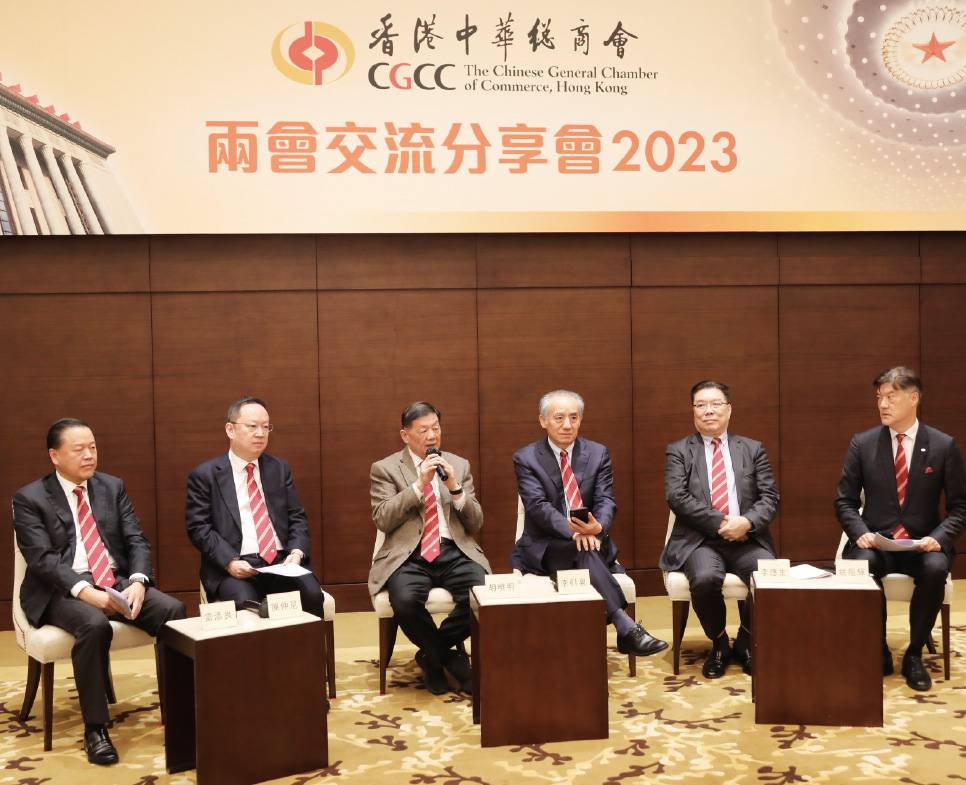
This exchange and sharing meeting featured dialogue sessions, where many of the Chamber's office bearers, standing committee members and committee members shared their impressions of and takeaways from their participation in the “Two Sessions” this year. At the session for Hong Kong's deputies to the NPC, members discussed the opportunities arising from the country's push for institutional reform and innovation.
Herman Hu, the Chamber's Vice-Chairman (NPC Deputy), said that the country's establishment of the new Hong Kong and Macao Work Office (HKMWO) that is under the Central Committee of the CPC to manage Hong Kong and Macao affairs shows that the Central Government places great importance on the two special administrative regions (SARs). Our state leaders have repeatedly mentioned in the past that the rejuvenation of the Chinese nation cannot be separated from the prosperity of Hong Kong and Macao, which shows that the work of the SARs is very important to national development.
Li Yinquan, the Chamber's Vice-Chairman (NPC Deputy), said that the clear definitions of the country's current system at the 20th National Congress and this year's “Two Sessions” have far-reaching implications, i.e., first, the country implements a “socialist system with Chinese characteristics in the new era”; second, the country's system is based on public ownership and supports the common development of diverse forms of ownership; third, China implements a socialist market economy, which is different from a planned economy; finally, the “One Country, Two Systems” principle must be adhered to, which has implications for Hong Kong's future development.
Andrew Yao, the Chamber's Vice-Chairman (NPC Deputy), said that the NPC, which is the highest organ of state power in China, has four important powers. The first is the legislative power, e.g., this year's NPC session deliberated on the Legislative Law; the second is the power to elect and appoint members to the central state organs, e.g., this year's session elected the president and appointed the premier and several ministers of the country; the third is the power to make decisions, e.g., it decided that this year's GDP growth target is about 5%; the fourth is the oversight power, including overseeing the reports of the Supreme People's Court, the Supreme People's Procuratorate and other organs. The NPC has also been keeping an eye on the governance of Hong Kong, e.g., it has played an important role in the recent Hong Kong National Security Law and the improvement of its electoral system.
In the view of Tommy Li, the Chamber's Life Honorary Chairman (NPC Deputy), the country's numerous accomplishments in the past year are unparalleled by other countries. For example, its people did not have to spend a single cent out of pocket on anti-epidemic efforts; the country has been able to control inflation to below 3% amid high global interest and inflation rates; it stated “unwavering consolidation and development of the state-owned economy” in tandem with “unwavering encouragement, support and guidance for the development of the non-state-owned economy,” indicating its support for both state-owned enterprises or private enterprises; the country's total grain output reached 1.37 trillion jin (685 billion kg) last year, ensuring enough food for its people. In addition, President Xi stressed that the long-term prosperity and stability of Hong Kong and Macao are part and parcel of building a strong China, which highlights the great importance the country attaches to Hong Kong.
Rock Chen, the Chamber's Life Honorary Chairman (NPC Deputy), said that the topmost priority in the institutional reform of the State Council this year is technological and financial reforms. Hong Kong can contribute to the country with its own strengths in the financial field. For example, in the process of RMB internationalization, it can strengthen interconnection with the Mainland's financial system to assist the country in “going global”. In addition, one of the key points of the country's financial reform is to safeguard the bottom line of preventing systemic financial risks. In this regard, Hong Kong can serve as a testbed to play a role in safeguarding financial security.
Lui Tim-leung, the Chamber's Committee Member (NPC Deputy), said that a lot of improvements have been made in the financial field in the recent institutional reforms of the State Council, the CPC and the state. At the level of policy implementation, a new State Administration of Financial Supervision has been set up and the China Securities Regulatory Commission has been upgraded to be an organ directly under the State Council, with the added responsibility to cover bond issuance. As far as Hong Kong is concerned, the above-mentioned reforms, when implemented, are set to further strengthen its financial cooperation with the Mainland, which will also benefit the country's financial internationalization.
As for the CPPCC National Committee session, members shared how to function as CPPCC members and tell the good stories of China and Hong Kong to the wider world.
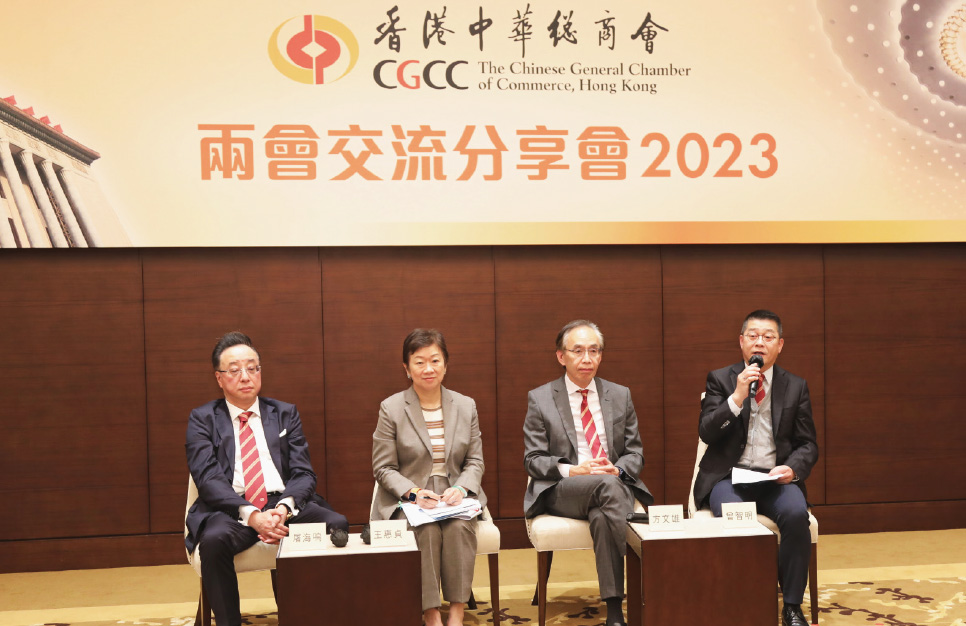
Connie Wong, the Chamber's Vice-Chairman (CPPCC National Committee Standing Committee Member), said that she had the strong impression that the country had been thinking about the needs of the people in the past five years as it accelerated the construction of high-speed rails, highways, airports and power generators to provide more convenience for the rural population. She stressed the importance of Hong Kong's integration into the Greater Bay Area and national development, and wanted to organize more Mainland and overseas networking missions to tell the good stories of China and Hong Kong on all fronts.
Tu Haiming, the Chamber's Standing Committee Member (Deputy Director of the Committee on Liaison with Hong Kong, Macao, Taiwan and Overseas Chinese of the CPPCC National Committee), said that Hong Kong's CPPCC members must fully implement and promote the four “hopes” raised by Wang Huning, Chairman of the CPPCC National Committee, including firmly safeguarding national security, sparing no effort in economic development, supporting the HKSAR Government in resolving concerns around people's livelihood, enhancing ideological guidance, building consensus and jointly supporting the “One Country, Two Systems” principle to promote the sustainable development of Hong Kong's economy and society.
Ricky Tsang, the Chamber's Vice-Chairman (CPPCC National Committee Member), stressed that at present, Hong Kong's young people still have insufficient understanding of the country's national conditions. Therefore, in his view, CPPCC members should encourage the new generation of Hong Kong to learn more about the country's latest developments and actively integrate into them. He suggested using Shenzhen and Nansha as pilot areas to set up and run more schools for Hong Kong children in order to provide education that is closer to national conditions for Hong Kong students studying in the Mainland. In his view, this will make Hong Kong's young people more integrated with the country.
In the view of David Fong, the Chamber's Life Honorary Chairman (CPPCC National Committee Member), many foreign businesses at present only have a one-sided understanding of Hong Kong's current situation, so he suggested that the Hong Kong business community should tell the good stories of China and Hong Kong to the wider world and refute the smears against Hong Kong from external forces through different media. In addition, this year's CPPCC session has added the principle of “patriots administering Hong Kong” to its general charter, which will give the wider world more confidence in Hong Kong's prospects.
The Chamber's Committees Further Explored Guiding Principles of “Two Sessions”
The Young Executives' Committee held a luncheon with the theme “Guiding Principles of ‘Two Sessions' and Youth Development”, Ricky Tsang; Bonnie Wong, the Chamber's Committee Member (CPPCC National Committee Member); Kenneth Fok and Iris Wong, NPC Deputies, were invited to be guest speakers.
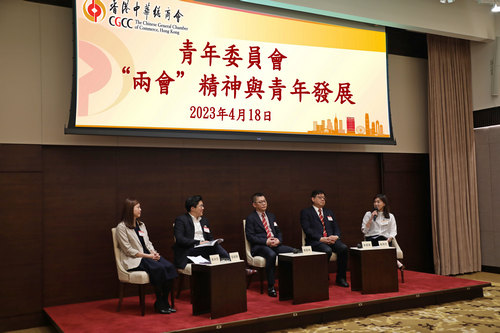
At the sharing meeting held by the Ladies' Committee on the guiding principles of the “Two Sessions”, Connie Wong and Pansy Ho, Chairperson of the Hong Kong Federation of Women (CPPCC National Committee Standing Committee Member), together with Cally Kwong, Ginny Man and Eileen Tsui, NPC Deputies, were the guest speakers.
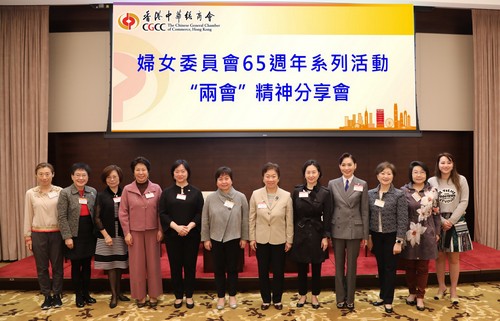
The District Affairs Committee held a briefing on the first session of the NPC, where Tommy Li gave a briefing on the government work report, the new state leadership team, and the development priorities for the new journey. Kevin Fan, the committee's Vice-Chairman (CPPCC National Committee Member), also shared his impressions of and takeaways from his first participation in the CPPCC National Committee session.
